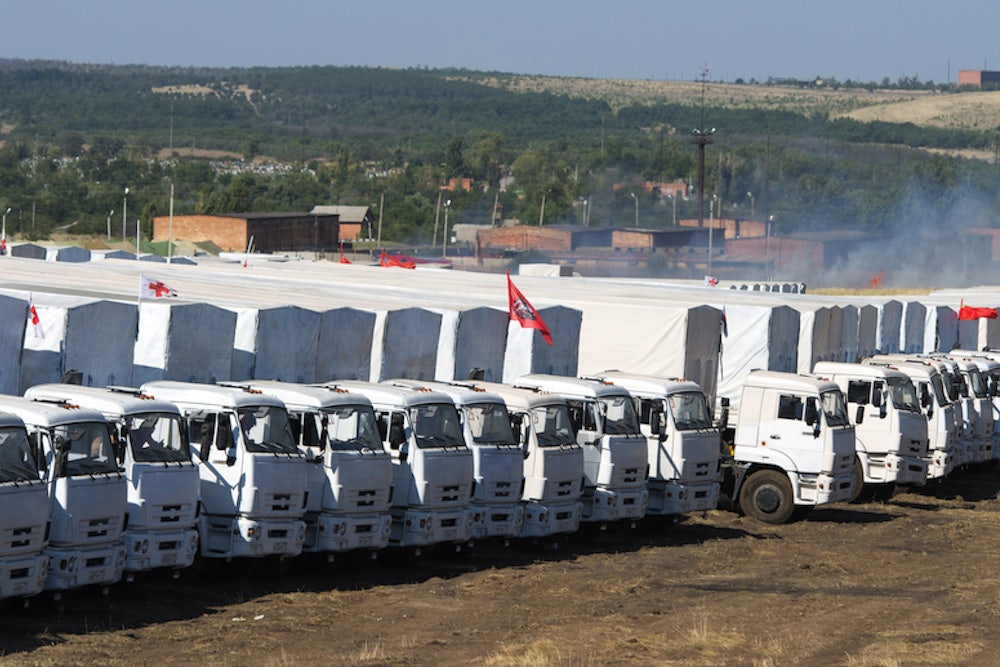Russia’s humanitarian aid convoy is no Trojan Horse, but that doesn’t matter—what’s inside the trucks is less important than what's behind them. The convoy is currently parked at the Russia-Ukraine border, waiting for directions from the Kremlin about what’s next. On Thursday, some of the drivers let journalists take a look at the cargo. There wasn’t much to look at: The trucks are indeed carrying humanitarian aid, but they’re “almost empty,” BBC’s Steve Rosenberg reports.
But Thursday evening, the Guardian’s Shaun Walker and the Telegraph’s Roland Oliphant witnessed a column of 23 armed personnel carriers cross the border from Russia into Ukraine. Russia has been building up forces around Ukraine’s borders, on all sides, for days, leading many to conclude that the Kremlin had finally decided to stage an outright invasion of eastern Ukraine. Already, Ukraine claims to have destroyed several of the APCs that entered its territory Thursday night. Russia denies they exist.
Ukraine says it is readying for the final battle, Alec Luhn reports. "We have done the preparatory work for the final stage, the liberation of cities. I should say it will take more than one or two days," Andrey Lytsenko, a spokesman for Ukraine’s national security and defence council, said Friday. Ukrainian forces have surrounded the besieged city of Donetsk, where civilian casualties continue to rise amid heavy shelling on both sides. Over the past two weeks, the number of deaths caused by the crisis in Ukraine overall doubled, to at least 2,086, according the U.N.
Meanwhile, strange things are afoot among separatist leaders. It appears that Russia is pulling out its operatives in eastern Ukraine, and “they are largely being replaced by local unknowns,” Radio Free Europe reports. Yesterday, the independent Ukrainian television network Hromadske published an audio recording of a conversation ostensibly between an agent in Russia’s Federal Security Service (FSB) and a rebel in eastern Ukraine, in which the two discuss how the rebel, might be able to escape to Crimea. Two separatist leaders, Igor Girkin (also known as Igor Strelkov), until recently the defense minister of the Donetsk People’s Republic, and Valeriy Bolotov, the leader of the Luhansk People’s Republic, unexpectedly resigned on Thursday. The whereabouts of Girkin, an obsessive war reenactor in his previous life, have been unknown ever since rumors earlier this week suggested that he had been gravely injured in fighting.
As has been the case throughout the conflict, Russia’s actions are utterly divorced from its words. On the one hand, Russia is in the midst of a serious mobilization at the border. On the other, it is withdrawing operatives from the east, calling for an immediate ceasefire, and pledging that it will not enter “war or any conflict,” as President Vladimir Putin put it. Addressing Russian politicians in Yalta yesterday, Putin struck a decidedly conciliatory tone, calling for an immediate halt to violence in Ukraine, and saying that Russia should not "fence itself off from the outside world,” that “Russia should learn from mistakes." The Kremlin had publicized the address as a “major speech,” but strangely, as Nataliya Vasilyeva reports, it was barely broadcast on Russian television. “Russian state television stations had no live feed from Yalta and buried the event deep in their programs, only showing Putin with a voiceover,” Vasilyeva writes.
Even more strangely, just before Putin took to the podium in Yalta, Vladimir Zhirinovsky, the deputy speaker of the Russian Duma, suggested that Russia should consider restoring its empire and that Putin should be called the “supreme leader” of the country, according to TV Rain. Zhirinovsky is known for his extremist remarks—last week, he said that if war were to break out between Russia and the West, then Poland and the Baltic nations would be "wiped out." Putin, for his part, told the politicians in Yalta that Zhirinovsky’s remarks did not reflect the official stance of the Russian Federation.
However conciliatory Putin’s remarks may be, de-escalation seems a long way off in Ukraine. As we have already learned, Russia may participate in diplomatic talks on the crisis, but it will interpret those talks as it pleases. Putin has already strong-armed his way into deciding the terms of Ukraine’s E.U. Association Agreement, and he’s certainly not going to let eastern Ukraine slip out of the Kremlin’s control. As the Moscow political consultant Igor Bunin told Anna Nemtsova, there are likely two competing strategies in play: “Some suggest that through humanitarian aid the Kremlin could start peace talks with Kiev, others insist that the victory of Novorossia is very close and that he should push for a chance to bring in a real military convoy.” The foreign ministers of Russia, Ukraine, France, and Germany will meet to discuss the situation in Berlin on Sunday. “Whether it’s at a square table or a round table,” Ukrainian Foreign Minister Pavlo Klimkin tweeted, “We need to talk.”
